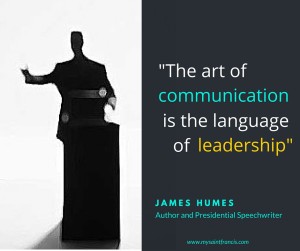Leadership is Communication ...

Leadership is Communication . . .
Author and presidential speechwriter, James Humes, said, “The art of communication is the language of leadership.” And, renowned leadership consultant, John Maxwell, has defined leadership in one word: “influence.”
In brief, in order to influence others – to be a leader – one must be able to communicate effectively. To do so, one must understand that communication is an art.
St. Francis College Prep’s stated mission to “inspire students to leadership . . .” requires us to place a premium on this art. We cannot effectively be turning learners into leaders without teaching good communication skills.
Additionally, we understand that good communication skills correlate to the next part of our stated mission, “ . . . through a 21st Century education . . .” as well.
As we have shared before, a 21st Century education refers to the strengths students need to be successful in today’s market. Among these strengths is the ability to “collaborate” with others, and you cannot collaborate without effective communication.
One of the best statements on effective communication was by the Nobel and Oscar winning playwright, George Bernard Shaw who said, “The single biggest problem in communication is the illusion that it has taken place.”
How true is this? How many times have we heard someone say something we are sure they said, only for them to tell us later that what we heard was wrong?
Even more frustrating, how many times have we clearly said something, only for someone to tell us they heard something completely different?
Teaching students the art of communication means that we will be teaching them to know when they have or have not effectively communicated. This requires much more than just writing or talking. It requires understanding, listening, critical-thinking, and sensitivity. But, what it requires most is a focus on others versus a focus on self.
Which is why the final part of our stated mission, “ . . . founded upon the Catholic faith and tradition” is so important.
It is through the Catholic worldview – a focus on others versus self – that our students will learn good communication skills and, in turn, through good communication skills they will have influence – they will be leaders.
The heart of the wise makes his speech judicious and adds persuasiveness to his lips. Proverbs 16:23
